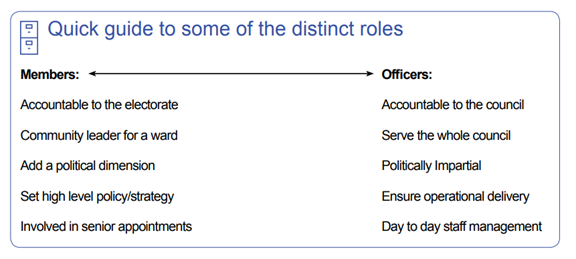BLOG- Key learning points – effective member officer relations, by Cath Buckley, Senior Governance Consultant, CfGS
Working in local government is unlike any other organisation and working in democratic services and scrutiny is unlike any part of local government! It’s a balancing act between providing support to councillors to conduct their role effectively and working with officers and partners to ensure that the items they bring to the committees are purposeful. High performing democratic services teams understand the importance of strong working relationships and how to navigate the political dynamics to help ensure that decisions are made in the right way for the people who live in their local area.
However, a good understanding of the distinct roles of officers and members is not universal across councils. With local government covering such a breadth of service areas there are many officers who are far removed from the democratic process and may never encounter members whilst conducting their daily work. This means that there isn’t a widespread knowledge of the role of elected members and can result in a lack of understanding of where and how decisions are made. Amongst elected members too, there can be a lack of awareness about their own role in the organisation and how that differs to that of a paid officer. There can also be some confusion around members access to information and what information should be shared by officers and with whom.
Good working relationships have a significant impact on how councils perform in delivering public services to their residents and communities and for ensuring that public money is spent effectively. Often, when things go wrong in local authorities it is because there has been a misunderstanding between the roles and boundaries between officers and members, and relationships have become difficult.
At CfGS we feel it is vital that everyone working in local government has knowledge of how the roles of members and officers differ. This quick guide from the LGA workbook on effective relationships is a helpful way to remind everyone of the two distinct roles.

Officers should be indispensable to members and members should be indispensable to officers, and for this to happen the relationship should be built on mutual trust and respect.
Of course, good relationships that are built on these strong foundations are important in all aspects of life and how we behave towards others is very much a personal choice. In local government there will naturally be a churn of members and officers over time – and being able to act consistently regardless of the behaviour of others is crucial.
Remembering to respect one another’s skills and attributes and the unique perspective that each role can offer is vital. Members bring insight from their local communities and officers bring expertise from their profession. Working together with a shared appreciation of the different roles and responsibilities offers potential to improve services and decision making.
CfGS can support authorities who may want to strengthen the member officer dynamic by reinforcing some of the key messages we’ve highlighted here. Focused learning sessions can work well to explore common scenarios and think through how they could be dealt with. Holding mixed learning sessions can also help members and senior officers understand one another’s perspectives and build mutual trust and respect.
Please do get in touch if you want to find out more. Info@cfgs.org.uk




